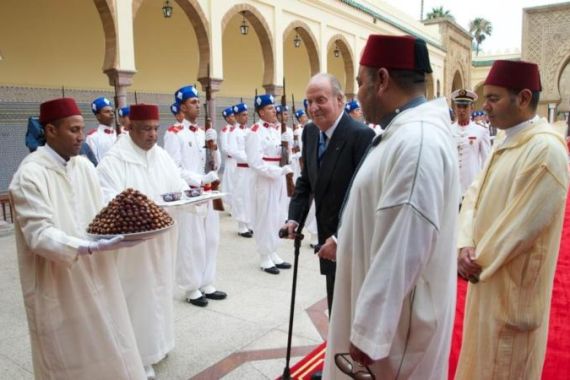Judicial reform demanded in Morocco
After the release of a paedophile, Morocco may change its pardon policy – but many want wider reforms.

Marrakech, Morocco – The pardoning of a paedophile by Morocco’s king last month ignited a public outcry, causing some who had been apolitical to demand radical changes in the country and a serious reform of its justice system.
“This woke up my conscience,” said Khalil El Abbadi, a 34-year-old engineer from Casablanca. “Voicing our beliefs has become an obligation and a necessity.”
The rare show of outrage came after the release of Daniel Galvan Vina, a Spanish citizen convicted of raping and filming 11 Moroccan children. Moroccans from across the social spectrum, many of whom did not belong to any political movement, publicly voiced their outrage over the pardon, prompting King Mohammed VI to reverse his decision.
Abbadi protested alongside many of his countrymen – the first time he has dared to openly show his indignation against the ruler. He said that following the news on Twitter exposed him to realities that he was not aware of, that were missing in the traditional media. He empathised with the families of the victims and weighed the damage to the nation’s reputation.
“I had a feeling of rage, of humiliation and above all, a sense of being a second-class citizen,” he said. “In this country, the dignity of the citizens is not the priority of the state.”
The Moroccan king pardoned 48 prisoners on the annual Throne Day in July as a courtesy gesture a few days after the Spanish monarch, King Juan Carlos, visited the North African country. Galvan Vina was among those released. But the Moroccan media, the government and most political parties remained largely silent about the decision, while protests exploded across Morocco.
|
|
| Inside Story – The shame of a royal pardon |
One demonstration in Rabat, the capital, was violently suppressed by the authorities. But by then, after days of pressure, the king decided to reverse course and revoked the pardon. Galvan Vina was swiftly arrested in Spain and now awaits a decision on extradition proceedings to Morocco.
While the pardon may seem to have been reversed simply to keep the peace, analysts say it signals a significant shift in Morocco’s societal values and has shaken the sense of the king’s infallibility. This unprecedented direct dialogue between the king and the people in Morocco has also revealed weaknesses in state institutions, a topic that had been completely absent from public debate.
“The king had to release a statement justifying his actions,” said Abdellah Tourabi, historian and editor of the monthly magazine Zamane. “This non-structured movement without an ideology, advocating for equality and rejecting authoritarianism, snatched justifications from the king… These people will be watching and already showed their capacity of mobilisation.”
The king called the pardon a mistake, and said he did not know a paedophile was among those given clemency. In a statement about the decision, the king hinted that the pardoning procedure would be reformed – something protesters have been demanding, due to the process’ lack of transparency and rumours that pardons may be bought.
Still, some are demanding wholesale reforms to the judicial system. Two years ago, hundreds of judges created an organisation to protest against judicial corruption and interference from the executive branch, which they say undermines their independence.
The 3,700 members of the Club of Moroccan Judges, established in August 2011, have been pushing for significant reforms, demanding better salaries and working conditions. But while the king appointed a commission made up of lawmakers to make changes to the judiciary at around the same time, many Moroccans have little faith in the project.
“We are asking for real independence,” said Aziz Nizar, a former president of the Moroccan Judges Association based in Rabat. “The king made a very promising speech in August 2009, [but] we are still waiting to see. There is a need for a separation of powers, and the king shouldn’t be naming judges anymore.”
Nizar said judges could no longer work under conditions where their free will was limited, and that the organisation plans strikes in the future to keep pressure on the commission.
Moroccan Justice Minister Mustapha Ramid has also admitted that the pardon procedure needs to be reformed. During an interview on the state-run network 2m, the minister said that the Galvan Vina case “has provided the right conditions to review the procedure of pardon, and it is the time to set well-defined criteria for granting it and make the necessary amendments to adapt the text to the legislation in this area”.
But Ibn Kafka, a prominent Moroccan blogger who writes on the legal system, believes there can be no quick fixes to the issues facing the country’s judiciary. The system, he says, needs to rebuilt from scratch. “Pardons come at the end of the judicial chain, and if the rest is corrupt and ineptly managed, there’s no reason for pardons to function spotlessly,” he said.
Ibn Kafka argues that change can only come from the bottom, namely from the people protesting on the streets. “Civil society needs to keep up the pressure and come forward with concrete proposals, or else we’ll end up like in June 2011, with a mediocre constitutional text being rammed down our throats,” he said, referring to a new constitution that was adopted to stall “Arab Spring” protests in the country.
So far, many Moroccans seem prepared to keep pressure on the king and his regime. “I want to live in a country where the interests of the citizens are at the centre of the concerns of the state,” said Abbadi, the Casablanca-based engineer.
He is not the only one who will be taking action and watching. Using Twitter, a user named “Lambertiste” wrote: “In the future, I wish good luck to paedophiles and lax judges. Impunity is over. Each case will be followed, closely.”
Follow Aida Alami on Twitter: @AidaAlami